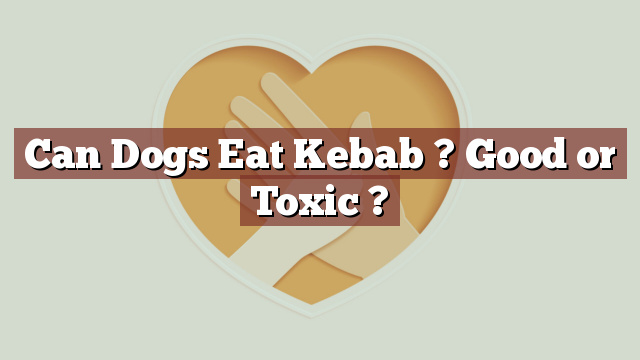Can Dogs Eat Kebab? Good or Toxic?
When it comes to our beloved furry friends, it is essential to be aware of the foods that are safe for them to consume. Many dog owners may wonder whether or not their canine companions can enjoy a tasty kebab. In this article, we will explore the nutritional value of kebab for dogs, delve into the safety and potential toxicity of this food, discuss potential risks and benefits, and provide guidance on what to do if your dog happens to consume kebab.
Nutritional Value of Kebab for Dogs: Important Considerations
Kebab, a popular dish consisting of grilled or skewered meat, can vary in its nutritional composition depending on the ingredients used. Generally, kebab includes a combination of meat, spices, and sometimes vegetables. Meat, being the primary component of kebab, provides essential proteins, vitamins, and minerals.
Proteins are crucial for dogs as they promote muscle growth and repair. They also aid in the production of enzymes and hormones. Additionally, vitamins and minerals found in kebab can contribute to a healthy immune system and overall well-being of our canine friends.
Can Dogs Eat Kebab? Understanding the Safety and Toxicity
Can dogs eat kebab? It is important to note that while some ingredients in kebab may be safe for dogs, others can pose a threat to their health. Onions, garlic, and certain spices commonly used in kebab preparations are toxic to dogs, as they can cause damage to their red blood cells and lead to anemia. Moreover, excessive consumption of fatty kebab meat can result in pancreatitis, a painful and potentially life-threatening condition for dogs.
It is best to avoid feeding kebab to your dog, especially if it contains ingredients that are harmful to them. Opting for safer alternatives specifically formulated for canine consumption is a much wiser choice.
Potential Risks and Benefits of Feeding Kebab to Dogs
Feeding kebab to dogs can pose several risks due to the potential toxic ingredients. As previously mentioned, onions, garlic, and certain spices can cause serious health issues in dogs. The risks of pancreatitis also increase with the consumption of high-fat foods like kebab. Therefore, the potential risks of feeding kebab to dogs should be carefully considered.
While there may be some nutritional benefits from the meat in kebab, they can be outweighed by the dangers associated with other ingredients and the high fat content. It is crucial to prioritize your dog’s health and well-being over any potential benefits that kebab may offer.
My Dog Ate Kebab, What Should I Do? Steps to Take
If your dog accidentally consumes kebab, it is important to take immediate action. Contacting your veterinarian should be your first step. They will provide professional guidance based on your dog’s specific situation. Be prepared to provide information regarding the ingredients of the kebab, the quantity consumed, and any symptoms your dog may be experiencing.
Your veterinarian may advise you to monitor your dog for any signs of toxicity or gastrointestinal distress. In severe cases, they may recommend inducing vomiting or performing other necessary medical interventions. Always follow the advice of your veterinarian, as they are the best source of information regarding your dog’s health.
Conclusion: Proceed with Caution When Offering Kebab to Dogs
In conclusion, it is not recommended to feed kebab to dogs due to the potential risks associated with toxic ingredients and high-fat content. While the meat in kebab can provide certain nutritional benefits, these advantages are outweighed by the potential harm it can cause to our furry companions.
It is crucial to prioritize the health and safety of your dog by choosing appropriate and specifically formulated dog-friendly foods. When it comes to their diet, consulting with your veterinarian is always the best course of action.
Thank you for investing your time in exploring [page_title] on Can-Eat.org. Our goal is to provide readers like you with thorough and reliable information about various dietary topics. Each article, including [page_title], stems from diligent research and a passion for understanding the nuances of our food choices. We believe that knowledge is a vital step towards making informed and healthy decisions. However, while "[page_title]" sheds light on its specific topic, it's crucial to remember that everyone's body reacts differently to foods and dietary changes. What might be beneficial for one person could have different effects on another. Before you consider integrating suggestions or insights from "[page_title]" into your diet, it's always wise to consult with a nutritionist or healthcare professional. Their specialized knowledge ensures that you're making choices best suited to your individual health needs. As you navigate [page_title], be mindful of potential allergies, intolerances, or unique dietary requirements you may have. No singular article can capture the vast diversity of human health, and individualized guidance is invaluable. The content provided in [page_title] serves as a general guide. It is not, by any means, a substitute for personalized medical or nutritional advice. Your health should always be the top priority, and professional guidance is the best path forward. In your journey towards a balanced and nutritious lifestyle, we hope that [page_title] serves as a helpful stepping stone. Remember, informed decisions lead to healthier outcomes. Thank you for trusting Can-Eat.org. Continue exploring, learning, and prioritizing your health. Cheers to a well-informed and healthier future!

